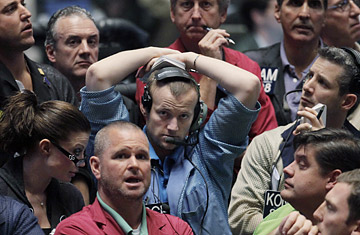
Traders could face higher costs under any Tobin tax
There's nothing like financial Armageddon for reviving the work of an old economist. Amid the recessionary doom and gloom, the world has channeled Adam Smith, dusted off John Maynard Keynes and revisited Eugene Fama. In recent days, it's been James Tobin's turn. Close to four decades since the Yale economist proposed a levy on foreign-exchange transactions — or a "Tobin tax," as the suggestion became known — the idea is enjoying a new lease of life. At a meeting of G-20 finance ministers last weekend, British Prime Minister Gordon Brown suggested the group of leading countries consider the tax to establish "a better economic and social contract between financial institutions and the public based on trust and a just distribution of risks and rewards."
There's little disagreement that by picking up the banks' half-a-trillion-dollar repair bill, taxpayers got a rotten deal in the financial meltdown. How to make sure they're not forced to pay a second time is unclear. A levy on financial-market transactions, stretched beyond foreign-currency trades to cover stocks, derivatives and other clever instruments, might offer twin benefits. By slapping an additional fee on each transaction, the tax "would naturally drive [investors] toward those that are more sensible, more profitable, more rational," suggests Julian Jessop, chief international economist at the consultancy Capital Economics in London. What's more, even a modest levy on the world's financial markets — Tobin first proposed a 1% charge on currency deals, before advocating even lower rates — would generate hundreds of billions of dollars in revenue.
For politicians desperate to win over vexed voters, it's a convenient notion. Indeed, French President Nicolas Sarkozy, suffering in polls almost as badly as Brown, has previously argued in favor of the tax. Look beyond that, though, and support for the measure starts to wane. The levy is "not something we're prepared to support," U.S. Treasury Secretary Timothy Geithner said in response to Brown's call. Officials from Russia, China and the European Central Bank also shied away from it.
Why the poor reception? For a tax that's attracted high-profile backers like Brown and Sarkozy, its track record is thin. When Tobin first proposed the idea in 1972, it was seen as a way to stop currency speculators after the collapse of the Bretton Woods system of fixed exchange rates, but it was never imposed. Sweden enacted a tax on certain financial transactions in the 1980s but ditched it in 1991 after trading volumes sank.
Today, there are bigger obstacles to its implementation. First, there are the tax's tricky practicalities: Which financial transactions and institutions do you target? And who pays, administers and regulates it? But possibly more importantly, every major financial center would need to be on board for the levy to be effective. Investment banks wouldn't likely leave Britain for cheaper foreign currency–trading in Macedonia, but they might well if that opportunity was in Manhattan. Advanced economies imposing the tax unilaterally "would see their financial markets decimated," Howard Wheeldon, senior strategist at BGC Partners in London, wrote in a note to clients on Monday.
For those looking to such a tax to protect against future calamities, there's even more disappointment. Squeezing the volume of financial trading wouldn't have done much to tackle the eye-watering debts and shoddy risk assessment at the oversize banks that got us into the current pickle. That job falls to regulators. Moreover, evidence of the impact of transaction charges on the volatility of assets is mixed: buyers in Britain's housing market — which, like many others around the world, cratered in 2007 — have been required to pay a transaction tax on their purchases for years.
All of which leaves the tax as a basic means of raising funds. And in that respect, there may be simpler methods. Because of the lukewarm response from other countries to Brown's suggestion, the British government was quick to reduce the levy to one of several ideas the Prime Minister had for recouping taxpayers' billions. Another idea — that banks themselves pay into a central rescue fund, with contributions determined by a lender's size or risk exposure — could yet prove more popular.
With the IMF scheduled to report next April its own findings on possible funding options for future bailouts, banks will, in one way or another, be forced to put aside more to cover the costs. Tobin, were he alive, would surely welcome that.
